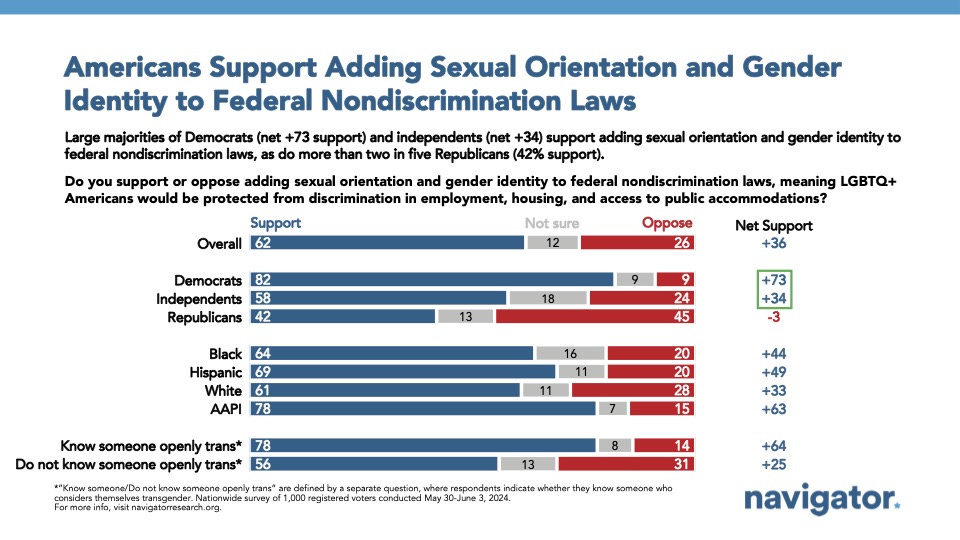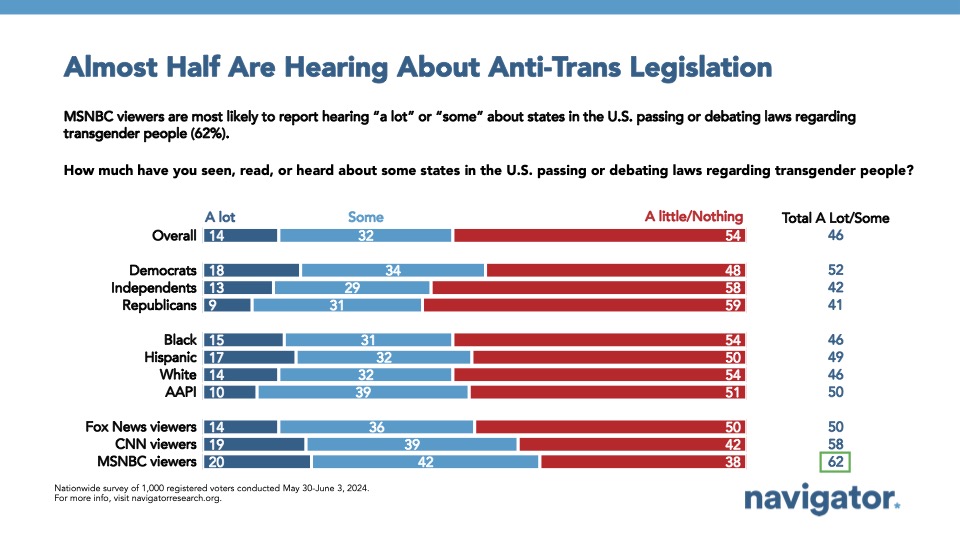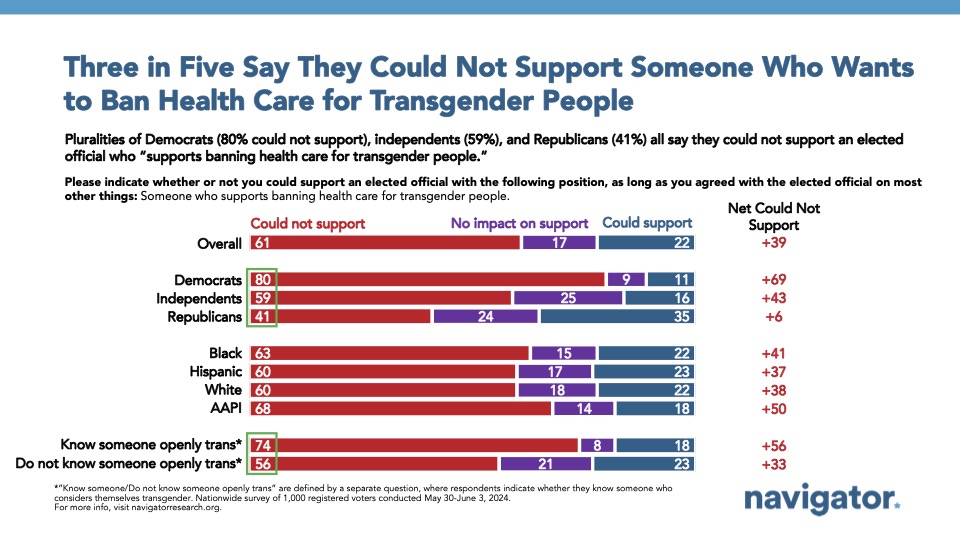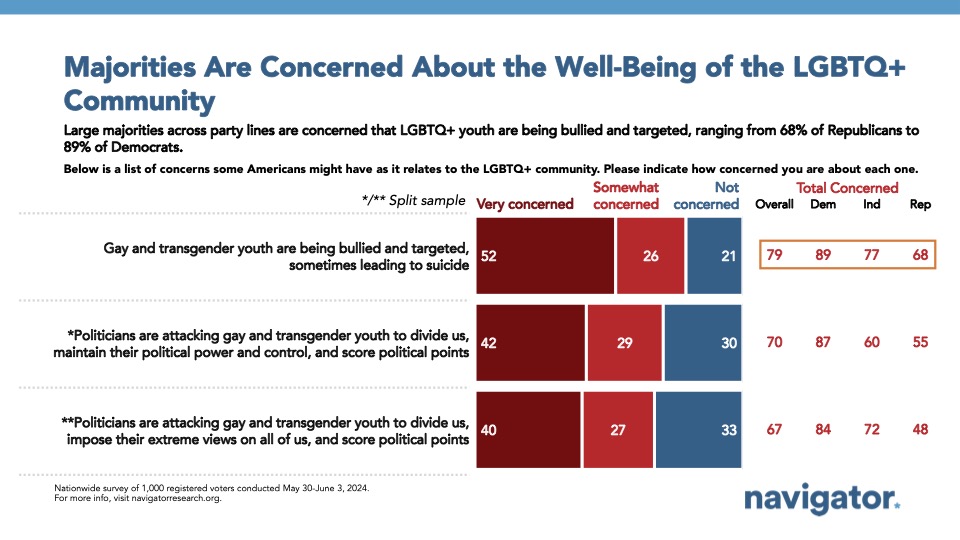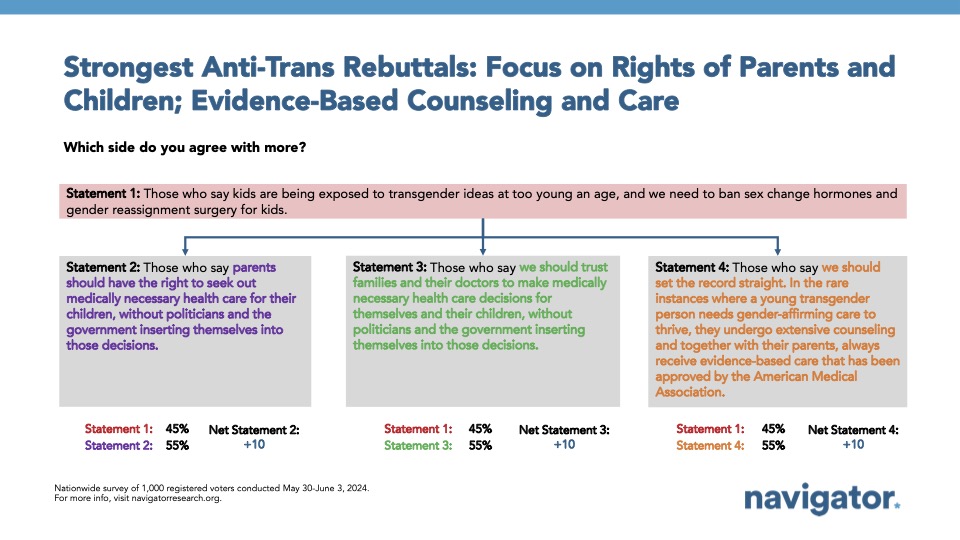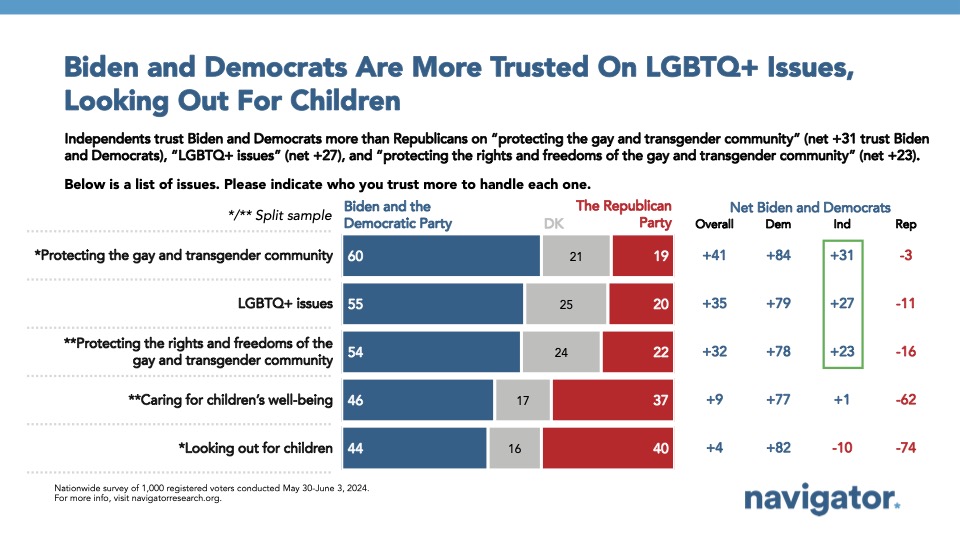Poll: Protecting LGBTQ+ Americans
This Navigator Research report contains polling data on the latest perceptions of LGBTQ+ issues in the United States, including support for adding sexual orientation and gender identity to anti-discrimination laws, perceptions of elected officials who support banning gay marriage and healthcare for transgender people, and the issues Americans find most concerning regarding LGBTQ+ youth.
Americans support adding sexual orientation and gender identity to federal non-discrimination laws.
By double-digit margins, Americans support legislation that protects the LGBTQ+ community from discrimination, and oppose elected officials who aim to limit freedoms. By a 36-point margin, Americans support adding sexual orientation and gender identity to federal non-discrimination laws in order for LGBTQ+ Americans to be protected from discrimination in employment, housing, and access to public accommodations (62 percent support – 26 percent oppose), including more than four in five Democrats (82 percent), about three in five independents (58 percent), and even two in five Republicans (42 percent) in support.
- A majority of Americans say they could not support an elected official who supports banning health care for transgender people (net +39; 61 percent could not support – 22 percent could support), with Democrats least likely to support an elected official with this position (net -69; 11 percent could support – 80 percent could not support), followed by independents (net -43; 16 percent could support – 59 percent could not support), and a plurality of Republicans (net -6; 35 percent could support – 41 percent could not support).
- 54 percent of Americans have seen, heard, or read “a little” or “nothing” about states in the United States passing or debating laws regarding transgender people, while 46 percent have heard “a lot” or “some.” Among the 27 percent of Americans who have transgender people in their life, awareness of laws regarding transgender people is stronger, with three in five having heard “a lot” or “some” about these laws (63 percent). This level of awareness is 23 points higher than among Americans who do not know someone personally who identifies as transgender in their life (40 percent).
Four in five Americans are concerned that LGBTQ+ youth are being bullied and targeted.
The top concern Americans have related to the LGBTQ+ community is that gay and transgender youth are being bullied and targeted, sometimes leading to suicide. Four in five Americans are concerned about gay and transgender youth being bullied and targeted (79 percent), including a majority of Americans who are “very” concerned (52 percent). Strong majorities across party lines find this issue concerning, including 89 percent of Democrats, 77 percent of independents, and 68 percent of Republicans.
- More than two in three Americans express concern that “politicians are attacking gay and transgender youth to divide us, maintain their political power and control, and score political points” (70 percent, including 42 percent who are “very” concerned), and that “politicians are attacking gay and transgender youth to divide us, impose their extreme views on all of us, and score political points” (67 percent, including 40 percent who are “very” concerned).
The strongest rebuttals to anti-transgender messages focus on parents, families, and doctors being the most trusted to make sensitive health care decisions — not politicians.
When presented with the conservative argument “those who say kids are being exposed to transgender ideas at too young of an age, and we need to ban sex change hormones and gender reassignment surgery for kids,” Americans agree more with the progressive argument that “those who say parents should have the right to seek out medically necessary health care for their children, without politicians and the government inserting themselves into those decisions” by 10 points (55 percent progressive argument – 45 percent conservative argument). Other top rebuttals include to the conservative argument include:
- We should trust families and their doctors to make medically necessary health care decisions for themselves and their children, without politicians and the government inserting themselves into those decisions (net +10; 55 percent progressive argument – 45 percent conservative argument); and,
- Those who say we should set the record straight. In the rare instances where a young transgender person needs gender-affirming care to thrive, they undergo extensive counseling and together with their parents, always receive evidence-based care that has been approved by the American Medical Association (net +10; 55 percent progressive argument – 45 percent conservative argument).
President Biden and Democrats are significantly more trusted to handle LGBTQ+ issues than Republicans.
By a 41-point margin, Biden and Democrats are seen as more trusted than Republicans to protect gay and transgender communities (60 percent Biden/Democrats – 19 percent Republicans), to handle LGBTQ+ issues more generally (net +35; 55 percent Biden/Democrats – 20 percent Republicans), and to protect the rights and freedoms of the gay and transgender community (net +32; 54 percent Biden/Democrats – 22 percent Republicans).
- By smaller margins, President Biden and Democrats are also more trusted to handle caring for children’s well-being (net +9; 46 percent Biden/Democrats – 37 percent Republicans) and to handle looking out for children (net +4; 44 percent Biden/Democrats – 40 percent Republicans).

